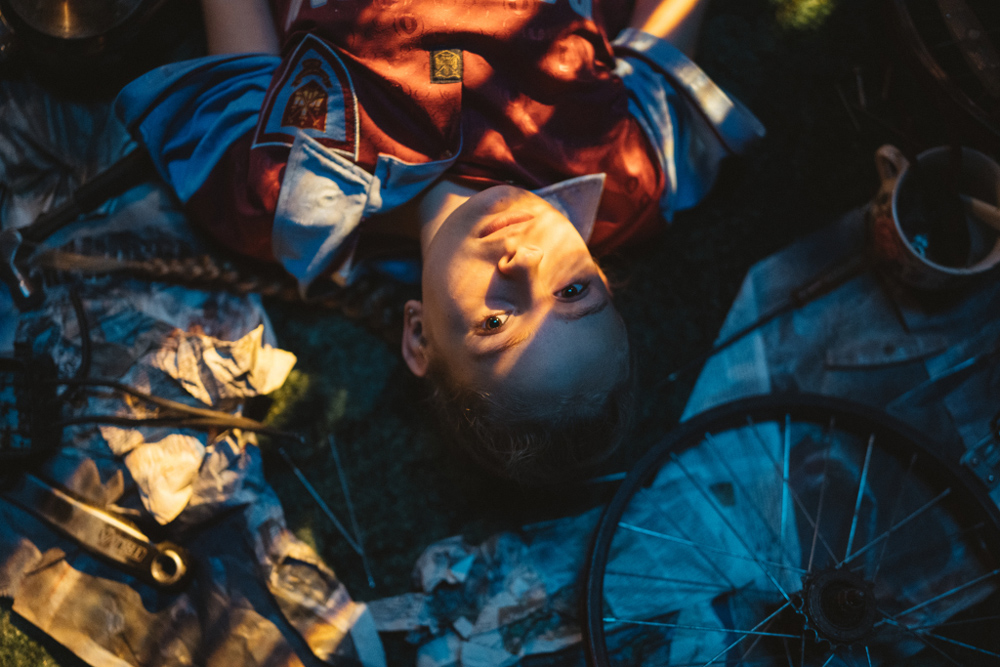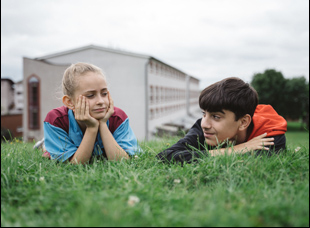Although things can get occasionally sketchy, you never really question how Georgie (Lola Campbell) has made it on her own for so long in the wake of her mother’s death in “Scrapper,” only 12 and living by herself in the flat they once shared, but certainly smart enough to outwit any calls from child welfare to come her way and stealing just enough bikes with her friend Ali (Alan Uzun) to put food on the table. It’s a mad, mischievous genius that one suspects writer/director Charlotte Regan applied not only to telling the story of Georgie, whose long-absent father Jason (Harris Dickinson) shows up to upend her life even further, but in bringing it to the screen so vibrantly, occasionally polling the neighborhood at large to take the temperature on what they think is going on in Georgie’s apartment and making a spider in her room a central character.
Adorable as “Scrapper” may be, it is also exceptionally poignant as Georgie and Jason start engage in a relationship where one can’t be sure of who holds all the authority and between Campbell and Dickinson’s crackling chemistry, cinematographer Molly Manning Walker’s exquisite command of light and dark in the apartment they share and the big, bright world that Regan envisions right outside their doors as a playground for them to find their footing, the film explodes from the small, intimate character study it seems destined to be at first into evidence of a major new filmmaker capable of broadening horizons for all as she spies on Georgie and Jason doing so for one another. After taking home the Grand Jury Prize at Sundance, “Scrapper” is opening in theaters across the U.S. and its native U.K. this week and Regan generously spoke about her wildly inventive and heartrending comedy, breaking with her home country’s long tradition of kitchen sink realism and her healthy attitude towards reading criticism.
We started it years ago, so I tend to forget why we even started it or what was at the start of it. I think I just wanted to spend a nice summer with my friends and some cool actors and this was like a great excuse.
Is it true you actually had a draft greenlit and then reconceived it quite a bit during lockdown?
Yeah, we did quite a few big rewrites. The first draft was like a grandson and his nan trying to escape from drug dealers, and it was much more like a Guy Ritchie crime shootout-y kind of film. And I’m very bad at like tweaking [a script], so if I’m given too much time, I tend to start again, which no one who’s part of the process enjoys, but I watched the video ages ago where someone said, “You should do your script and then lock it in a cupboard or in a drawer, and then in two weeks or a month, rewrite it. And whatever you don’t remember doesn’t deserve to be in there.” I don’t even know who said it, but ever since I listened to it, I’ve just lived by it for some reason, which is ridiculous and my producer hates, but what can you do.
Was at least this particular area in mind? It’s so colorful with these beautiful hills.
No, it wasn’t. We always wanted somewhere that had like a magic to it. I’ve always been keen to tell working class stories that are joyful and British cinema [about the working class] in particular has a habit of being super-desaturated and like so depressing and everyone is like so defined by their trauma instead of their character or their love, so that came into the color palette and we just loved the space as soon as we found Limes Farm, the estate we filmed on. We painted the houses [because] from the start I was quite adamant that we had to do something like that because if it rains, which it often does — British summers are a bit rubbish, that would always lift it [when] there’s only so much the DP can do.
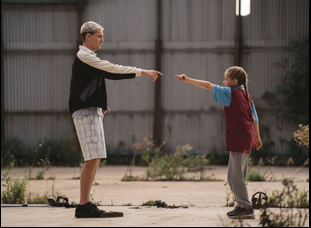
Yeah, in loads of ways. Spending all summer with them reminded me and Theo, the producer, how much rubbish they talk. They can just talk rubbish for hours, and everything is so dramatic and emotional. They would fall out over like who ate the last sweet, and the friendships would be ruined for days. Then suddenly we’d go again on the weekend and they’re all best friends again. Or if they hadn’t eaten lunch, they were all so moody. I just loved how dictated kids are by their emotions and how present they are, [something] I think we kind of lose that as we get older and we start to like contextualize everything. But kids are just there, they’re just existing and they’re hungry or they’re moody or they’re happy and the doc reminded us of that.
What sold you on Lola to star in this?
Shaheen [Baig] cast it with us and Lola sent in this really long rambling self-tape about Home Bargains, which is a discount store over here and a ridiculous topic to talk about for so long. She didn’t do any of the things I asked her to do in the tape, but as soon as I saw it, there was something magical about her. She’s so mature and so capable of having adult conversations and knows what you want before you even express it, but then has such a childishness to her as well. You could give her a water gun and you’d lose her for three hours because she’s just shooting everyone from the balconies, so she just had that real balance that I find working class kids in particular have because they’ve had to shoulder so much and it really worked for the character of Georgie.
One of the brilliant things you do script-wise also is have the neighborhood chime in, not entirely sure of what’s going on with her, but perhaps knowing more as casual observers about what’s she’s grieving. Was that something foundational?
It was in there quite early on, for sure. It’s very much like how I remember growing up in a working class community, which is that even though there is hardship and tough times and you’re struggling, it pushes everyone together and there’s always this sense of community where you sit and you hang out with your neighbors. Everyone knows each other, so I think that was always at the center of the script.
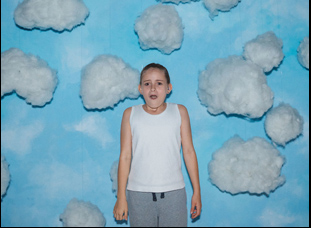
Elena [Muntoni, my production designer] and I went to school together and lived a few streets away from each other, and my DP, Molly [Manning Walker], who’s a director who made an incredible film [in her own right] is one of my best friends. The same with Theo [Barrowclough], my producer — I live like two roads away from him and spend most of the week with him, so especially because of the kids, it was very much in our minds when we were picking [locations] that the environment had to be like joyful and it had to first and foremost, a good experience for the kids and having a Molly and an Elena [around] who are great humans really helped.
Harris Dickinson is also quite great in this, and once he starts working with Lola, is there anything about the dynamic that takes on a life of its own?
Harris is such a incredibly selfless actor, and it takes a lot to know that the kids are the leads and it hinges on [Lola]’s performance. So to come into it and to support that as well as give your own great performance is something that I don’t think many actors could have done. I’ve worked with Harris before, so I think we always knew that he is just the nicest, most grounded human you’ve ever met, which is so rare because acting is such a self-reflective kind of art. It’s hard not to get caught up in how do I look and how am I doing? But he was incredible. And Lola was quite suspicious of him at first. She doesn’t really care that he’s an actor because she doesn’t come from an acting world, nor has her family pushed it on her. She just saw this and did it for fun, so she was like, “Well, he’s got to earn my trust. I don’t care that he’s in movies,” especially because Lola loves “EastEnders.” She doesn’t love movies at all, so you could say any movie Harris has been in, and she could not care less. But if he’s a nice person, then I’ll be nice to him, so they were imitating the script in that way. We shot semi-chronologically and their friendship off-screen developed as their on-screen one did, which was really magical.
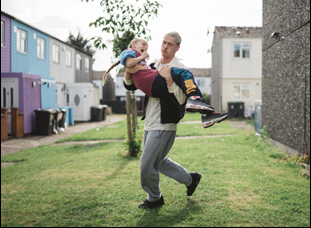
Molly, my DP, is incredible and she had to work around a lot. I don’t like to put like lights on the floor or that it all has to come through windows or practical lights because I just think the space should be [the actors] and there shouldn’t be equipment in the way, so [the idea] always was that the camera had to be able to look everywhere and couldn’t be in the way of the kids because if they give you some amazing blocking, you should move around to [accommodate] that. But [Molly] was amazing. She came up in music videos too and had lots of brilliant references and was never scared of [thinking] if the light wasn’t motivated. It didn’t matter. She was [always thinking] we’re going stylized so we can push and break those conventions a little bit more than normal, which is cool.
This is coming out in both the UK and the US on the same day. What’s this like to get out into the world?
It’s nice that you get to talk to people about it and they’ve taken their own ownership of it or they’ve connected in some way. I really love the really negative reviews as well which is insane, but they bring me so much joy. My mom and I go through Letterboxd and we’d go to the lowest ones possible, [and think] “This one’s cool. Look at this one.” And often I’m like, “They’re right. That bit was bad. I wish I would have fixed that.” That brings me joy, but I’m trying to not be defined by the response in the film. I’m just finding it a privilege that it’s finding an audience.
“Scrapper” begins its theatrical run on August 25th in New York at IFC Center and Toronto at the Bell Lightbox and expands on September 8th. A full list of theaters and dates is here.




